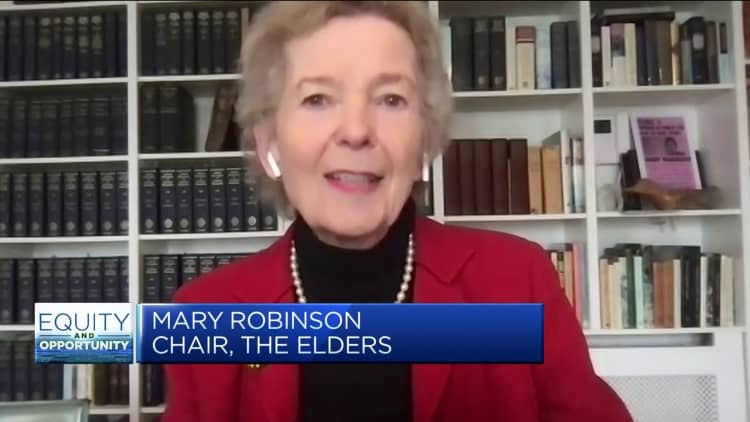Scott Olson | Getty Images
Social media firms have responded to accusations of “shadow banning” their users on Palestine-related content amid the Gaza conflict, saying the suggestion that Big Tech is “deliberately and systematically suppressing a particular voice” is false.
They have been accused of blocking certain content or users from their online communities since the start of the war between Israel and Hamas, which began in October.
Queen Rania Al Abdullah of Jordan, for example, criticized major platforms for allegedly restricting Palestinian content about the war.
“It can be almost impossible to prove that you’ve been shadow-banned or censored. Yet it is difficult for consumers to trust platforms that control their content from the shadows based on unclear standards,” Queen Rania said at the Doha Web Summit.
They have been criticized for relying too heavily on “automated content removal tools to moderate or translate content related to Palestine,” according to Human Rights Watch report on the subject.
Hussain Freyeh, vice president of MENA for Snapchat, told CNBC’s Dan Murphy at Web Summit Qatar last week that these firms have “a really important role to play in the region.”
“We have all the algorithms in place to moderate content,” Freyech added, saying the platform also uses “a human component to moderate that content to make sure it’s safe for our community.”
As the information war plays out online between pro-Palestinian and pro-Israeli narratives, platforms like Snapchat and Meta-owned Instagram and Facebook have become a key source for users seeking content and information about the conflict.
Foreign journalists are not allowed to report from the besieged Gaza Strip, blocking international media coverage. Journalists have begged Israel to reconsider access, saying on-the-ground reporting is “mandatory.”
The Middle East depends on social media
The Middle East is one of the youngest regions in the world and according to a UNESCO 2023 report, “young people in the Middle East and North Africa region already get their information from YouTube, Instagram and Facebook.”
According to OECDmore than half the population (55%) of the Middle East and North Africa is under 30 and nearly two-thirds rely on social media for news.
Dozens of Instagram users, who preferred to keep their identities private, told CNBC that posts or stories that included ground footage of the Gaza war or social commentary from Palestinian or pro-Palestinian voices received less engagement than their other posts. is related to war.
These same users report that posts often take longer to be seen by followers, or are sometimes skipped in a series of stories. Users also told CNBC that some posts were deleted from Instagram and were told that such posts did not follow “community guidelines.”
One Instagram user told CNBC that the alleged “shadow ban” on their account and others on their network did not begin on October 7, saying they had seen content restricted in previous iterations of Israeli-Palestinian violence, namely during forced removal of families in the Sheikh Jarrah neighborhood of East Jerusalem in 2021. CNBC has not independently verified these claims.

Meta too rolled out a “fact check” feature on Instagram last December, increasing speculation that the social media site has censored certain content.
A Human Rights Watch report on Meta’s alleged censorship, published in December 2023, found that “the parent company of Facebook and Instagram has a well-documented record of overly broad crackdowns on content related to Palestine.”
The report added: “Meta’s policies and practices are silencing voices of support for Palestine and Palestinian human rights on Instagram and Facebook in a wave of heightened social media censorship.”
The report documented more than 1,000 content “takedowns” from Instagram and Facebook platforms from more than 60 countries between October and November 2023.
A Meta spokesperson told CNBC that the HRW report “ignores the realities of implementing our policies globally during a fast-moving, highly polarized and intense conflict, which has led to an increase in the content we are being reported on.”
“Our policies are designed to give everyone a voice while keeping our platforms safe. We readily admit that we make mistakes that can be frustrating for people, but the suggestion that we are deliberately and systematically suppressing a particular voice is false.”
Speaking more broadly, a Meta spokesperson told CNBC that “Instagram does not intentionally limit the reach of people’s stories” and that it “does not hide/prioritize posts from a user’s followers based on whether a hashtag tagged to the post is blocked “.
In addition, Meta uses “technology and human review teams to detect and review content that may violate our Community Guidelines. In cases where we determine that the decision is inaccurate, we will restore the content.”
Meta also told CNBC that “given the larger volumes of content that are reported to us, we know that content that doesn’t violate our policies can be removed in error.”
https://www.cnbc.com/2024/03/06/social-media-firms-reject-shadow-banning-allegations-on-palestinian-content.html

